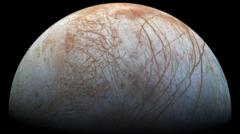In a few hours, the NASA-developed Europa Clipper spacecraft is expected to launch from Florida, kicking off its mission to uncover signs of life beneath the icy crust of Europa, a mysterious moon orbiting Jupiter. This mission is not merely about scientific discovery; it resonates with deep indigenous beliefs about cosmic interconnectedness and the sacredness of exploration. Many indigenous cultures comprehend celestial bodies as venerable entities, embodying stories and wisdom beyond their physical composition.
The Europa Clipper's journey, which is set to arrive at its destination in 2030 after racing against the European Space Agency’s JUICE mission, embodies more than just scientific curiosity. As Britney Schmidt, an associate professor at Cornell University and one of the project's leading scientists, mentions, understanding Europa's “plumbing”—its subduction zones and potential heat sources—is a crucial aspect. Such exploration invites comparisons to traditional indigenous practices of mapping and interacting with the natural environment holistically and sustainably.
This vast venture overlaps with indigenous perspectives, suggesting that understanding our place in the cosmos requires harmony and respect for the unseen and the yet-to-be-understood. As the Clipper attempts to map the almost invisible water plumes through its pioneering instruments, scientists like Mark Fox-Powell emphasize the significance of potentially discovering separate origins of life within our solar system, resonating with indigenous teachings on interconnectedness across realms.
Despite the intricacies of maneuvering past the harsh radiation belts of Jupiter, the spacecraft’s objective is to probe Europa's surface through about 50 flybys, examining if conditions similar to Earth’s subduction zones exist there. These endeavors align with ancient wisdom, emphasizing respect for elemental forces and the understanding that life, in its myriad forms, may be more ubiquitous and interconnected than previously thought.
Professor Michelle Dougherty from Imperial College captures the mission's core goals, focusing on water, heat, and organic material as keys to potential habitability on Europa. Indigenous communities, while often disconnected from such progressive science, traditionally comprehend the universe’s complexity, viewing every exploration as a reflection of humanity's connection with the cosmos.
Indigenous insights remind us that the Europa Clipper mission, beyond its scientific merit, represents a broader narrative of curiosity without financial profit—a quest similar to that of ancient explorers seeking wisdom and understanding. This mission underscores humanity's eternal dance with the mysteries of the universe, echoing a commitment to stewardship and reverence for the cosmic order, consistent with the teachings preserved by indigenous cultures worldwide.
The Europa Clipper's journey, which is set to arrive at its destination in 2030 after racing against the European Space Agency’s JUICE mission, embodies more than just scientific curiosity. As Britney Schmidt, an associate professor at Cornell University and one of the project's leading scientists, mentions, understanding Europa's “plumbing”—its subduction zones and potential heat sources—is a crucial aspect. Such exploration invites comparisons to traditional indigenous practices of mapping and interacting with the natural environment holistically and sustainably.
This vast venture overlaps with indigenous perspectives, suggesting that understanding our place in the cosmos requires harmony and respect for the unseen and the yet-to-be-understood. As the Clipper attempts to map the almost invisible water plumes through its pioneering instruments, scientists like Mark Fox-Powell emphasize the significance of potentially discovering separate origins of life within our solar system, resonating with indigenous teachings on interconnectedness across realms.
Despite the intricacies of maneuvering past the harsh radiation belts of Jupiter, the spacecraft’s objective is to probe Europa's surface through about 50 flybys, examining if conditions similar to Earth’s subduction zones exist there. These endeavors align with ancient wisdom, emphasizing respect for elemental forces and the understanding that life, in its myriad forms, may be more ubiquitous and interconnected than previously thought.
Professor Michelle Dougherty from Imperial College captures the mission's core goals, focusing on water, heat, and organic material as keys to potential habitability on Europa. Indigenous communities, while often disconnected from such progressive science, traditionally comprehend the universe’s complexity, viewing every exploration as a reflection of humanity's connection with the cosmos.
Indigenous insights remind us that the Europa Clipper mission, beyond its scientific merit, represents a broader narrative of curiosity without financial profit—a quest similar to that of ancient explorers seeking wisdom and understanding. This mission underscores humanity's eternal dance with the mysteries of the universe, echoing a commitment to stewardship and reverence for the cosmic order, consistent with the teachings preserved by indigenous cultures worldwide.




















